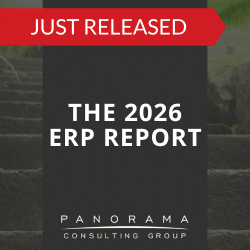Despite the time and resources invested, many companies struggle with their ERP implementation, leading to disastrous consequences.
In this blog, we’ll explore the cost of enterprise software failure for businesses, including how it can impact their bottom line and brand reputation.
5 Costly Consequences of ERP Software Failure for Businesses
1. Financial Costs
Enterprise software failure can have severe financial consequences. Failed ERP implementations lead to lost productivity and revenue, resulting in financial losses that can range from hundreds of thousands to millions of dollars.
In addition, businesses may have to spend money on legal fees and settlements due to lawsuits from disgruntled customers.
A Failed Payroll System Implementation
Panorama’s Expert Witness team was retained to provide a forensic analysis and written report to the court regarding the failed implementation of a major software developer’s ERP/payroll system.
2. Loss of Brand Reputation
In today’s world of social media and instant communication, bad news spreads quickly. Errors and delays in critical business processes can result in customer dissatisfaction that prompts customers to warn others. This can have long-lasting effects on a business, leading to decreased sales and difficulty in attracting new customers.
For example, in 2016, a major US airline experienced a massive software glitch that caused the cancellation of thousands of flights and stranded millions of passengers. The software malfunctioned, causing the company’s crew scheduling system to crash, leading to a complete shutdown of the airline’s operations.
The airline’s reputation was significantly tarnished, and the incident received widespread media coverage. Customers took to social media to express their anger and frustration, which led to a negative impact on the airline’s brand reputation. The company lost millions of dollars in revenue, and it took months to regain customer trust and confidence.
3. Reduced Productivity
ERP failures can result in a significant reduction in productivity. For instance, a company implements a new ERP system to streamline its production process, but experiences frequent system crashes and data errors. As a result, the production line slows down, causing a backlog of orders and shipment delays.
The frustrated employees are demotivated by the constant system issues, which lowers their morale and productivity. The company has to spend significant time and resources to fix the system issues and address the resulting productivity losses.
4. Inability to Meet Customer Needs
Enterprise software is designed to help businesses efficiently meet their customers’ needs. However, when these software implementations fail, businesses can find themselves unable to meet their customers’ demands.
For example, an e-commerce company might implement a new inventory management system without properly integrating it with their online store. This could result in inaccurate stock levels being displayed to customers, leading to orders being accepted for products that are actually out of stock.
5. Time-Consuming Re-implementation
If a business needs to re-implement enterprise software due to initial ERP failure, it can be a time-consuming process. This can result in a delay in implementing essential business processes, leading to further delays in revenue generation.
Additionally, the cost of re-implementation can add to the already high cost of failed ERP software implementation.
Avoid These Costly Setbacks
While it’s clear that the cost of enterprise software failure can be significant, it’s not always inevitable. As the use of enterprise software continues to grow, businesses must prioritize strategy over speed. This involves careful planning, selecting the right software, and hiring an experienced ERP implementation team, like Panorama Consulting.
Successful ERP implementation involves much more than just installing new software. It requires a strategic approach focused on increasing efficiency, streamlining processes, and improving customer satisfaction.
With careful planning and execution, you can avoid the high cost of enterprise software failure, enabling you to thrive in today’s competitive marketplace. Contact one of our ERP software consultants below for a free consultation.













